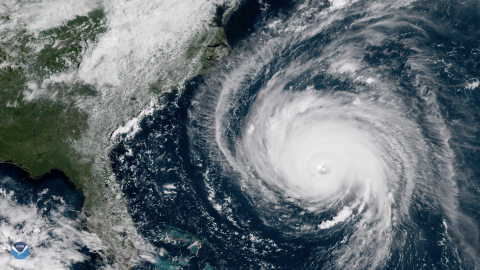Various planning updates are underway on Georgia's coast: the comprehensive plans for Chatham County and its cities, the Coastal Regional Plan, and the Jekyll Island Master Plan. Coastal plans must address the increasingly urgent causes and consequences of climate change to achieve community and regional planning benefits in making critical decisions that influence our future.

Over the past five years, climate disruption's dangerous impacts and causes have stirred well-founded public awareness and concern. Our rapidly growing understanding of the scale and significance of the causes of climate change and their grave consequences will be renowned as the fundamental "paradigm shift" of the 21st century.
Surveys consistently conclude that a majority now recognize that human activities are causing worldwide environmental degradation, which is of such urgency and magnitude that we must soon bring them under control or irreversibly impair the planet's life-support systems. Yet, until now, decades after these perils were well-known within the global scientific community, the plans of coastal Georgia's cities and counties have made little or no mention of climate change.
The only references to climate disruption in Georgia's coastal plans have concerned the rising sea level. These were limited to reactive adaptation, such as flood-control projects and flood-risk rating compliance. They were also all based on historical events, rather than the escalating science-based projections linked to global heating.
The current planning updates for coastal communities must acknowledge the urgency and acceleration of these hazards.
Moreover, planning must prioritize actions that reduce the cause of these accumulating hazards – namely, the emission of greenhouse gases – and protection of critical areas, both developed and natural, to the greatest extent possible. The alarming fact that some 43 percent of coastal Georgia residences are within the 100-year flood plain substantiates concern about escalating flooding.
Overdue recognition of climate-change impacts and causes in local and regional plans will have a critical advantage in an array of decision-making.
Furthermore, incorporating these considerations in planning documents, better positions our region in competition for imminent federal funding to support climate-related projects. Examples include flood-control infrastructure, clean-energy implementation, and power-transmission grid upgrades.
Local plans should consider fundamental global climate issues related to economic and technological factors analyzed in the National Intelligence Council report [GlobalTrends_2040.pdf (dni.gov)]. The Jekyll Island Authority should apply similar considerations in updating the master plan for Jekyll Island consistent with their obligations established in state law.
Likewise, the 2020 Oceans Climate Action Plan [Ocean Climate Action 2021 | Middlebury Institute of International Studies at Monterey], expresses priorities directly relevant to coastal planning, further emphasizing the central importance of climate issues in preparing planning updates.
Ocean-related planning for climate factors should be rewarded through land-use permitting, tax incentives, and infrastructure. Examples include:
- Coastal adaptation and financing.
- Developing clean, ocean-based energy sources.
- Reducing emissions by ports & shipping.
- Enhancing sustainable fisheries, aquaculture, and marine biodiversity conservation.
In revitalizing these plans, the respective planning authorities should clearly and resolutely echo the rationale behind Savannah's unanimous adoption of their 2020 clean-energy/carbon-reduction resolution. For similar reasons, other Georgia communities – such as Athens and Atlanta – and dozens of others across America are prioritizing actions curbing greenhouse gases.
The implications of climate-change analysis span the full range of planning elements, including infrastructure, land-use, economic development, transportation, housing, and natural resources, with crucial implications for quality of life and community goals.
If planners – at all levels – disregard or marginalize the urgency and importance of climate change and its causes, how can we expect elected officials and voters to give these matters well-deserved credibility and priority? If plans neglect to address such issues or treat them superficially, planning will become complicit in delays and half-measures that will seriously endanger the citizens within their jurisdictions.
It's a grave mistake to deflect these issues to the federal government, rationalizing the intransigence and conflicting interests of many of Georgia's officials as if these are immutable forces of nature.
To the extent possible, we need to make the planning process a participatory exercise that can effectively educate and engage the public (voters, taxpayers, and property-owners) and public officials.
Planning is the only formal (statutory) state process intended to address change and how local government should prepare for it. Therefore we must use planning as effectively as possible. Similar authority applies to JIA's obligations under state law governing Jekyll Island State Park.
The timing of these planning efforts is crucial. Climate scientists overwhelmingly warn that both remedial and preemptive actions will be essential at all levels during the current decade to prevent runaway temperatures from causing irreversible damage to earth's life-support systems.
Furthermore, respected business-sector sources such as Moody's Investor Services explicitly warn of the urgent need to reduce carbon emissions in addressing risk-management for developers and those who finance them. ["Climate change to force further …transformation," Moody's Report, April 2021.]
Thousands of properties are at risk in coastal Georgia. A clear, well-informed vision in coordinating planning efforts has never been more vital. [Union of Concerned Scientists: Rising Seas, Chronic Floods, and the Implications for U.S. Coastal Real Estate, June 2018.]
The Center for a Sustainable Coast recommends that the various planning authorities in coastal Georgia and the diverse interests they serve give serious consideration to these pivotal climate issues as they update plans.
These planning efforts must provide responsible, decisive guidance for our uniquely valuable and vulnerable communities in the challenging years ahead.

